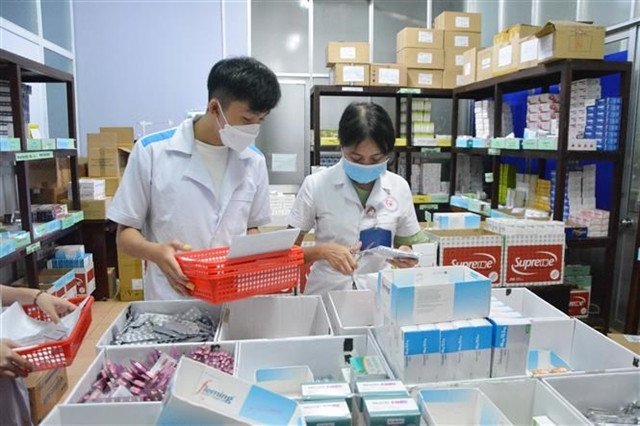
Lan was responding to a petition of voters from An Giang and Tây Ninh sent to the 4th session of the 15th National Assembly regarding the shortages of drugs and medical supplies in some public healthcare facilities.
Lan cited many causes, including the slow issuance and extension of circulation permits, psychological anxiety and fear of errors in organising procurement, shortage of specialised personnel to organise bidding, slow progress in the implementation of drug procurement belonging to the list of national centralised bidding, local negotiation and bidding, and little attraction of suppliers for small-scale bidding packages.
Some contractors have pulled out of the bidding process or cannot deliver as much stock as promoted.
Many bidding packages had to be put out for tender multiple times as nobody bid for them due to the fluctuations and increases in commodity prices on the market.
The Minister of Health said that in addition to completing legal procedures, the ministry would expedite the process of granting and renewing the registration certificate by the provisions of the Pharmaceutical Law.
This will involve issuing relevant circulars related to drug registration work, and promoting the reduction and simplification of administrative procedures, especially regarding the regulations for the renewal of registration certificates for drug circulation.
The Ministry of Health has reviewed and drafted a list of nearly 10,000 medicines to implement Resolution No. 80/2023/QH15 of the National Assembly dated January 9, 2023, directing the adjustment of declared prices for medicines, and re-declaring prices for products with objectively increased prices.
In addition, the Ministry of Health has decentralised the approval authority for the decision to purchase and plan to select drug suppliers for health facilities under the ministry.
The Ministry will also expedite purchasing, concentrate on national medicines, and negotiate prices.
In 2022, three drug procurement packages in the national centralised procurement list were successfully organised: a reduction of VNĐ1,418 billion (US$60.29 million), nearly 18 per cent lower than the planned price; successful negotiation of prices for 61 out of 69 drug items: a reduction of VNĐ1,995 billion (US$84.96 million), approximately 15 per cent lower.
The Ministry also strengthened political and ideological education and implemented solutions to stabilise the ideology of officials, public servants, and experts in appraising dossiers.
It continues to propose measures to overcome the situation of officials and experts resigning or not participating in appraising dossiers.
The ministry has amended regulations on drug registration fees and remuneration for experts to promote dossier appraisal work and has established four inspection teams to survey the supply and use of drugs, materials, and equipment at medical facilities.
At the same time, the Ministry has issued a document requiring health departments and central hospitals to report on the supply of drugs, materials, and medical equipment to assess the actual situation of drug and medical equipment supply at medical facilities.
In response to the question from voters about the service attitude of healthcare staff towards patients and their families, Lan said that the Ministry of Health had issued many directives to enhance professional ethics for all civil servants, officials, and workers in the healthcare industry.
According to the guidance of the Ministry of Health, all provinces/cities under the central government have established Steering Committees and implemented plans to renew the style and service attitude of healthcare officials in local medical facilities.
So far, most healthcare officials have committed to rigorously implementing the plan, achieving good results and receiving high evaluations from patients, their families, and the public.
To continue implementing the plan "Renewing the style and attitude of healthcare staff towards patient satisfaction," the Ministry of Health continues to promote the improvement of medical ethics among healthcare staff.
The Ministry is focussed on strengthening guidance and organising communication and behaviour skills training for all healthcare staff, including security, administrative, and cashier staff.
In addition, the Ministry is also developing criteria for evaluating the implementation of "Renewing the style and attitude of healthcare staff" and building "Green-Clean-Beautiful" medical facilities for greater patient satisfaction.
Units will base their self-evaluation on these criteria, and inspection teams from management agencies will conduct surprise and regular checks.
The Ministry continues to invest in infrastructure, equipment, and medical supplies while promoting administrative reforms and improving working methods and styles to be more appropriate. — VNS